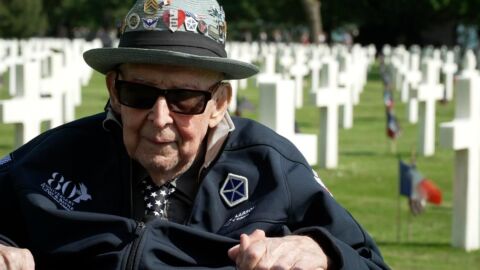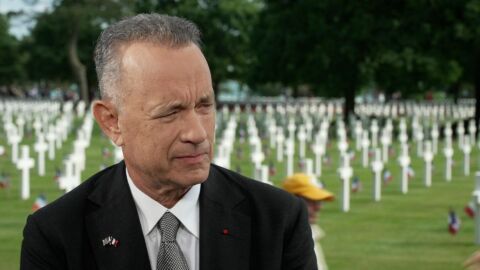Read Transcript EXPAND
CHRISTIANE AMANPOUR, CHIEF INTERNATIONAL ANCHOR: When we think of D-Day, perhaps the most vivid imagery comes not from the newsreels of the time, but from cinema. For example, the visceral, haunting scenes of “Saving Private Ryan.” That movie’s star, Tom Hanks, is an amateur history buff. He calls himself a lay historian, and he takes it really seriously. And since that film, he’s produced with Steven Spielberg, the acclaimed TV series “Band of Brothers,” “The Pacific,” and most recently, “Masters of the Air.” He came to Normandy this time now to pay his respects to the veterans, and I spoke with him about why this anniversary means so much, and about the importance of storytelling and remembering.
(BEGIN VIDEOTAPE)
AMANPOUR: Tom Hanks, welcome.
TOM HANKS, ACTOR AND FILMMAKER: Christiane, how nice to see you.
AMANPOUR: And here you — this is almost —
HANKS: What a day.
AMANPOUR: your home as well.
HANKS: What a day.
AMANPOUR: I mean, you’ve done so much on World War II. I just want to know what it feels like to be here on the 80th. It may be the last of these reunions.
HANKS: I don’t — I mean, I — we — if you do the math, if you were — say you were 17 years old, and you were making your first trip into combat. On June 6th of 1944, you would do the math, you’re now 97 years old. That they’re here — I mean, the first thing I say to any of the veterans that I happen to meet is, don’t get up, you know, because, you know, they’re more or less wheelchair bound. But there they are resplendent in their patches and their hats and their caps and the memories, and I ponder what these last 80 years have been for them. I want to ask them. What’s the most extraordinary thing you’ve witnessed since that day? And there’s an awful lot to take note of. But would any of it have happened if this day had not been?
AMANPOUR: Well, I wonder, you know, since you lead me straight into that question. It’s probably, OK, bar the Cold War, when there wasn’t a raging war in Europe, it’s probably the most difficult, most existential crisis for everybody since their sacrifice, with Russia having invaded Ukraine, with a literal raging war in Europe.
HANKS: I never thought there’d be a land war in Europe in my lifetime once again, because it had proven to be so disastrous for all of humanity the last time somebody tried that. And it’s funny how often it comes out of the ego of one human being. One guy back in the 1930 says, no, I’m going to solve all these problems because I know what works and what does not work. I think — you know, look, I’m a lay historian and I’m as opinionated as any knothead that you’re ever going to come across. But there was this thought that America — particularly America, was lazy, was divided, was undisciplined, that couldn’t get its act together, wouldn’t — that would never band together in order just to do the right thing by choice. And when I’m here, I think of a bunch of kids. It was a young force that came here. They were somewhere between — if you were 25 years old, they called you pops or they called you the old man. And they — and they were – – they left absolute all of the comforts of a very comfortable America, safe America on the other side of the ocean. And they put themselves here for what? Because it was the right thing to do. And they were not defending the status quo. They were not gaining territory. They were not here for riches. They were not here to conquer anything. They were really here in order to mend the future, if I can coin a word that has just come out in a book that I read not too long ago. There was an article, I want to say in the Bedford newspaper, in which, on the 6th June, because of the time lag made, it possible for the 6th of June to have this be the headlines in United States of America. And it said the next 50 years of European history is being decided right now in the fields and beaches of Normandy. It was not about everything that had happened prior to 1944. It was actually about what was going to happen in 1954 and ’64. I was born in 1956. Had D-Day not happened — and that’s not hard to imagine here, you can look around and we can see the evasion in our minds, we can see that day, but we can also imagine with a little bit of turn of frame, what if it had not happened, if this had stayed as it had been, a conquered territory by one of the most murderous regimes — there we go, as a FedEx is delivering my Uber lunch right now. What would have been like if all those — that young forces, and the Canadians, and the English, and all of the free (ph) countries had not come along and said those people are wrong.
About This Episode EXPAND
Today, veterans gather in Normandy to honor the 80th anniversary of the D-Day invasion. NATO Supreme Allied Commander General Christopher Cavoli discusses this historic anniversary. 101-year-old D-Day veteran Jake Larson joins Chistiane in the Normandy American Cemetery. Tom Hanks on the importance of remembering. Anilore Banon, sculptor of “Les Braves” on Omaha Beach, joins the show.
LEARN MORE

